Bodies At Risk: How Frontline NGO Workers in 3 Indian States Are Coping with the Lockdown
(Click here to download the full report)
Over the past few months of the pandemic & lockdown, the frontline NGO worker or the field worker has become a lifeline for marginalized communities across the country. Even as Governments deemed certain services as ‘essential’, access to the most to these services was limited to privileged communities. For the vulnerable, it was the front line worker who performed the essential service of making access to survival and basic necessities possible under the lockdown.
Even as many of us were secluded in safety, frontline workers were on the field in the middle on a pandemic facilitating a range of complex interventions – from providing first aid and relief to distressed children and families to rescuing a child laborer to stopping a child marriage. They had to cope with changes in the nature of their work, constantly evolving obstacles and challenges and larger confusions in the field and in the systems. And all the while, they were putting their bodies at risk. And they were constantly worried that they were putting their families and loved ones at risk as well.
‘Bodies At Risk’ is a rapid assessment report made with the intention of understanding how frontline fieldworkers, particularly those outside of major metros, are navigating professional and personal challenges in the anxious time of the ongoing Covid -19 pandemic. And it also attempts to immeasurable value of the work that they performed under the lockdown.
In an unjust world of yawning divides where even the courts and police were frequently found inadequate, the acts that the frontline workers put their bodies at risk to perform take in a significance beyond just ‘relief’ and can be considered as acts of humanity and justice.
Number of Frontline Workers Interviewed: 42
Number of States They Represented: 3 (Jharkhand, Odisha, Tripura)
Number of Districts They Represented: 23
48% of respondents were women & 52% were men.
- 47% of the respondents mentioned that the field areas they were visiting were classified either as Orange and Red zones. 41% of the respondents mentioned that their field areas were classified as Green Zones at the time of the interview. 12 % respondents mentioned that they were confused.
- 79% respondents mentioned that they continued visiting their field areas in spite of the pandemic and the lockdown. Although the frequency of field visits had reduced, 45% still visited their field areas thrice in a week. 10% visited field areas four times a week and 7% visited the field every day of the week.
- 93% of the respondents mentioned that there has been a major shift in the scope of their work. Prior to the lockdown, their on-ground interventions consisted of conducting awareness sessions with adolescent groups, training programs on various issues with community members, group meetings with Women’s Self-Help Groups, school outreach, parental awareness etc. All these activities have ceased in the field areas. Their work is now completely focused on COVID 19 related awareness and relief distribution.
- 62% respondents confirmed that they were given some form of orientation & training before they were asked to execute their current responsibilities in outreach, relief distribution & awareness on COVID 19.
- 76% of the respondents mentioned that they were receiving reports of new cases of child rights violations during the lockdown. The cases that are being reported to them are of Child Marriages, Sexual Abuse of Children, Domestic Violence of Women, Theft by Children, Missing Children, Child Labour & cases where children need food & medical attention.
- 33% respondents had not received their salaries since the lockdown. 23% have not received their salaries for the month of April & 10% have not received their salaries since March.
- 43% respondents mentioned that their families were angry, disturbed and tense on account of them going out for work in the field areas. Some respondents mentioned that nonpayment of salaries has resulted in a precarious financial situation for the families and thus it had been difficult for the family members to be supportive of the respondent’s work.
- 55% respondents mentioned that the families were not only supportive but also proud that the respondents were helping the most vulnerable in their time of need.
Click on the links below for a Spotlight on Specific On-Ground Challenges
- 1. Transport
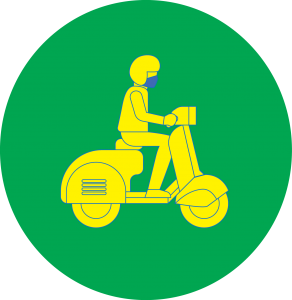
Majority of the respondents (91%) used their personal motorbikes or scooters to visit the field areas.
It was mentioned that only Childline workers had special passes to travel during the lockdown. The other respondents did not have special passes and faced trouble reaching their field locations (especially in the red and orange zones). They had to show the identity cards issued by their organizations to the police at different points and had to request them for permission to travel.
Usually, as a best practice, frontline workers, especially case workers travel in pairs so as to ensure personal safety and a support system in case of emergencies or while working in challenging circumstances. The changed travel rules under the lockdown (such as only one person on one motorbike) has led to a situation where majority frontline workers are travelling alone to field areas. This was reported to be a major challenge especially for female frontline workers.
Only 9% of the respondents mentioned that their NGO was able to arrange for a car to visit field areas during emergencies. Also unavailability of public transport has led to complete disconnect with the remotely located field areas. These areas have been inaccessible and the situation on ground is unknown to the frontline workers.
- 2. Stigma, Suspicion & Islamophobia
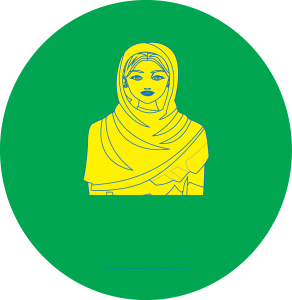
Many respondents mentioned that they were facing stigma in their own neighborhoods and also in the field areas they visit. One Muslim respondent specifically mentioned that people were looking at her differently since a communal angle to the outbreak was highlighted and publicized through government press conferences and news media. She reported that a few policemen have stopped her and questioned her on her way to the field areas and that this was particularly because she was identified as a Muslim.
- 3. Children in Need of Care & Protection
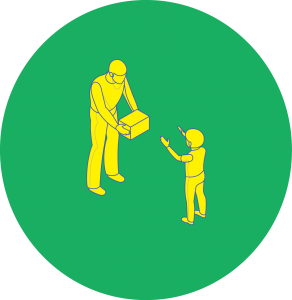
Across the three states, the respondents mentioned that the police have not been adequately responding to emergency calls made for cases of children in need of care and protection especially in cases of child marriages. The respondents mentioned that the police have been stating reasons such as lack of staff and vehicles to go out in the field area.
While majority of them mentioned that the Child Welfare Committees were accessible, some of them did say that the responses were slow in emergency matters. In one district, the CWC was completely inaccessible to the respondents.
They shared that sometimes the CWCs ask case workers to present the child through video calls. This had been a challenge in cases where children were not very comfortable appearing in front of a screen and also when there were connectivity issues.
Once the respondents had reached out to a child in need of care and protection, they mentioned encountering a host of challenges during the medical examination, particularly related to getting the child tested for COVID 19. They report a hostile ambience rife with stigma and suspicion in the hospital, Children found it difficult to comprehend as to why they were being treated in such a hostile and discriminatory manner.
Another major challenge the respondents reported was placing children in institutions during the lockdown. Several institutions had locked down and were refusing to take in new children due to the fear of COVID 19.
- 4. Relentless Demand for Ration
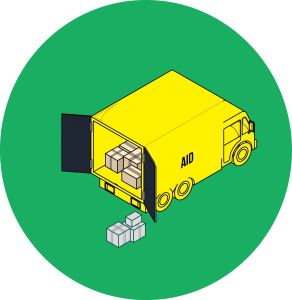
Most of the respondents report a relentless demand for ration from the ground. While they visit communities to spread awareness on COVID, general health, hygiene and social distancing, the people gather and start demanding for ration. Managing their expectations and ensuring that no voice is unheard has been the biggest challenge on the ground for many.
- 5. Adapting to the Internet
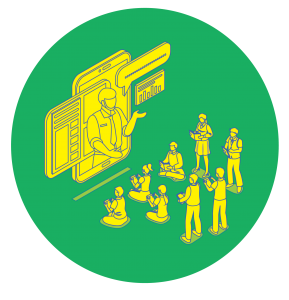
Many respondents mentioned that majority of the communities they work in have limited access to the internet and data. Thus, reaching children through remote means has been a challenge. They also mentioned that teaching children or spreading awareness through online means has been a challenge.
- 6. Working with Disabled Children & Adults
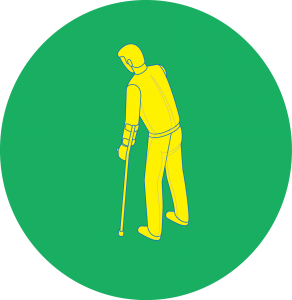
One of the organizations works with disabled children and adults and there is three step therapy process which they regularly administer to the physically disabled. Before the lockdown, the outreach workers would visit their homes to conduct these sessions that are essential for the well-being of their beneficiaries.
During the lockdown, they have had to switch to video calls or phone calls with the relatives of the beneficiaries. They were trying to teach them the basics of how they can conduct the therapy. They initially attempt a video call. If that does not work out, they would try phone calls and explain to the relatives as to how they could administer basic therapy. However, if both options don’t work out, they physically visit that home.The respondents mentioned that explaining the therapy and exercises over the phone has been challenge for them .
- 7. Quarantine Centers
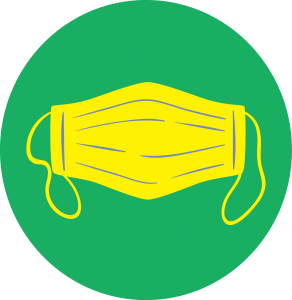
In some cases, the respondents mentioned that key government officers were missing from the quarantine centers and the officers who were present did not have a complete knowledge of the procedures to be followed.The respondents also mentioned that people in the quarantine centers were finding it difficult to accept and deal with their situation. They were extremely disturbed and were not sure of what was happening to them at the center. They felt like they were being treated like untouchables and their dignity wasn’t even taken into consideration in the quarantine camps. This has had an emotional effect on them and some of them refused to eat the food that was being distributed.
- 8. Child Care Institutions
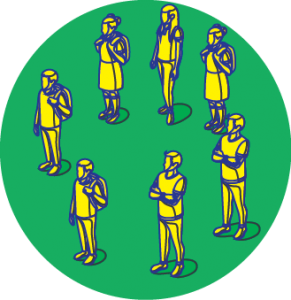
Respondents working in child care institutions mentioned extreme burn out as a challenge. They mentioned being short-staffed and an increase in their work load during the lockdown. With limited manpower, maintaining and managing every single child’s health and emotional well-being, additionally procuring supplies and all this with all the social distancing measures in place has been a herculean task.
The shelter home staff also mentioned that they were not very well versed with technology. Thus, coordinating with child protection functionaries and resource persons through video conferencing and other modes online was a challenge. They also felt that phone follow ups in existing cases were inadequate to understand the situation on the ground.
Click on the links below for Voices from the Ground
- 1. What if Something Happens in the Field
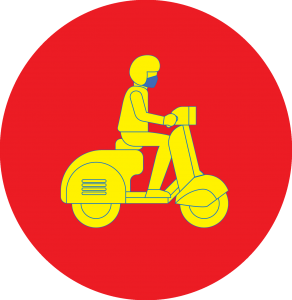
A very important part of our work is with children, men and women who have mental illnesses. They live with their families but are under regular medication. After the lockdown it became very difficult for many of them to go out and get medicines for themselves. So our team had to go to the field to help them with medicines.
We got special permissions from the local administration and got ourselves ‘Covid response passes’ for community outreach. This helped us to distribute essential food and medicines by conducting door to door visits. We also conducted therapy sessions in some cases which were extremely necessary but we made sure that we followed all protocols of safety and physical distancing.
On field work days, we have to carry food and ample amounts of water because there are no shops from where we can purchase. Before the pandemic, villagers and our beneficiaries used to offer us water or chai. However, due to protocols of distancing and also because the villagers are scared of contracting the virus this does not happen anymore. Now we make do with whatever we have.
The travel has also become riskier especially when one has to travel to the field alone. There are neither vehicles on the road nor any shops or people. For e.g. if our motor bike gets punctured, we have to contact the office and wait for someone from office to come and help us.
- 2. We are all Adjusting to The New Normal
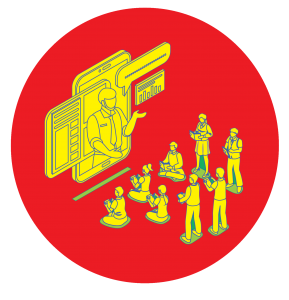
I work as a school in-charge in Tripura which has students from Junior KG to Class 5. After the lockdown, the classrooms have migrated to the virtual platform. When lockdown eventually extended longer than we thought, we struggled to put together a functioning virtual classroom.
We created separate WhatsApp groups for each class and added parents as the students are too young to have their own phones. For younger children, we even made videos of some lessons and forwarded them in the specific groups. For others, we sent PDFs and photographs of lessons and homework. Many parents aren’t capable of navigating through a smartphone. Even accessing WhatsApp groups, following up on the conversation and downloading the material is inconvenient for them. We decided to provide our personal phone numbers to the parents so they can reach out and clear any doubts about the homework, lesson plans or even how they can help their children in studying.
I am busier than before the lockdown. People call all the time with their concerns. The other day my daughter said “it is better if the electricity doesn’t work for some time so that you cannot charge your phone and then, you will get some free time, at least.”
Even after multiple phone calls with the well-intentioned parents, many still struggle with the new medium. Recently as the lockdown got a little lenient I started going to school again- twice a week to collect the fees as we still don’t have any virtual payment system in place. My family and friends are completely against this as going out isn’t still a viable option as there have been a lot of positive cases in Tripura. Also, the school is far from my house. I have to change three tuk-tuks. As the fare has also increased now, I end up paying about a total of 120 rupees every time I go to the school.
When I meet the parents face-to-face I take the opportunity to explain the functioning of WhatsApp groups to them. For many of us, this might seem simple but trust me, many of them aren’t habituated to such things. And most children are very young to even help them. I remember one day, a parent was accusing us of having no activity or engagement with the students and they said that they were receiving no material from the school. I helped him to find the WhatsApp group and open the PDF files that we sent over the last month. All of this is new for us. We are still in the process of learning and adapting to this new normal. If the lockdown doesn’t end soon we don’t know how to continue with this or even conduct exams.
- 3. This Disease of Touch
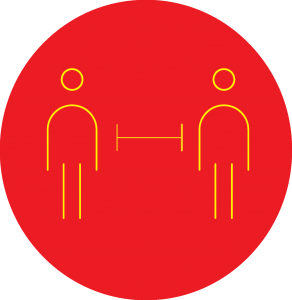
I work as an outreach worker in Jharkhand. After the lock down, we have been facing a lot of reverse migration. The administration has set up separate quarantine centres for the migrants coming from different zones. My work involves monitoring of quarantine centres where people have been admitted from both red and green zones. In initial phases of the lock down they were being given food and other essentials by the government but as time passed this has stopped. Now their families bring food and drinking water for the migrants.
When we go to the communities we have noticed that everyone is very scared of COVID-19. They think that it spreads with touch- ‘sabh isko chua chooth ki bimaari samajte hai.’ So when the family members come to the quarantine centres to give food to the migrants, they just throw polythene bags of food and water at them from a distance and leave. The villagers do not allow us or anyone else touch the hand pump which is used by the migrant workers fearing spread.
Even the government officials who come to visit the quarantine centres do not bother to get down from their cars. Even if we are standing at 6 ft. distance from them they say ‘aapko jo bhi bolna hai aap thodi doori se boliye’ (say whatever you have to say from a distance) because I work at the quarantine center.
My husband is no more. I and my son live with my maternal family. After the lock down began I went to meet my family. Before entering my house, I made sure that I washed myself and took a bath properly in the bathroom that is outside the house. My 20 year old son helped me with all this. Then he went to the kitchen to get chai for me. My older brother stopped him and said that since you were talking to your mother you are also infected and so you are also not allowed inside the house. My brother did not allow my bag to be brought into the house because he thought that it was infected. No one in my family was ready to even talk to me fearing infection. They said that if I wanted to live in the house I would have to isolate myself from the family members for 14 days and after that never go back to my job. They asked me to choose between my family and the job. I chose my job and came back. Now I live alone in a small apartment near my office.
- 4. Bad Covid… It Makes Me Stick Out and Feel Odd
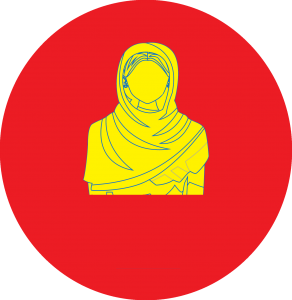
I work as a community mobiliser in Jharkhand. Since the beginning of the lockdown I along with my colleagues have been going to the community to distribute dry rations and also for distribution of sanitary napkins to women in the community as there was a serious scarcity in supply.
During these visits we made sure that we repeatedly informed them of all the precautionary measures that they can take to be safe from the virus. We wore masks and gloves while maintaining the required distancing protocols while speaking to them.
On one such visit, one of the woman beneficiaries with whom I was interacting remarked ‘yeh jo jholaran (muslims) log hai… wahi phaila rahe hai’ (they are the ones spreading the virus). I had been going to that community for a long time and never had I felt or been treated differently or been so aware of my religious identity. But this time I was taken aback and I felt really bad. Yeh jo covid-19, hai yeh bahut hi ganda covid-19 hai, jo humko odd feel karwya. (Bad Covid… It makes me stick out and feel odd)
- 5. Questions That Haunt People

“People are not really scared of getting infected with the virus. The real fear is around the current social and economic crisis in the country. Questions like …what will happen if the situation continues to be like this?
What if the disease never ends?
Will masks have to be made part of our lives?
What if things never go back to normal?
What if we are never able to travel again for work?…. These are the questions that haunt them.”
- 6. Predictions of a Post Covid World from the Frontlines
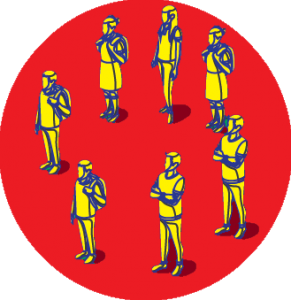
“We are still not thinking about the magnitude of what is about to hit us. Odisha could see more than 5 lakhs of migrant labourers returning to the State. These migrants will be unemployed, one doesn’t know how long they will get free ration, there will be hunger and so far, the Government has been unable to handle the situation well.”
“If children are hungry, how will they study? We have to ensure that children don’t go hungry and if children come to schools only for food and not for education there have to be alternative models to ensure we focus on their learning. Tuitions should be given and there shouldn’t be a dearth of teachers.”
“I feel that children in India may potentially be exposed to all kinds of violence.I worry for the children. I worry that some will take to life a crime. I worry that many will be abused in the shadow of the confusion caused by the crisis. “
“They will have many other things to worry about, social distancing will be the least of their worries. The stigma due to COVID 19 could affect some of our beneficiaries throughout their life”
“People have lost faith in governments. I feel that in case we stop supporting communities with ration, there is a possibility that they might lose faith and trust in NGOs as well”.
“There is an increased pressure with regards to my job security. How will I work without pay is my biggest fear? If the number of cases increase and there is a need to respond to the situation, how can I do that without proper pay?”


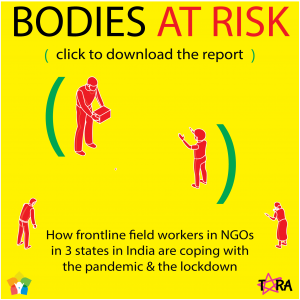
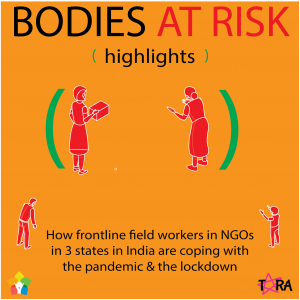
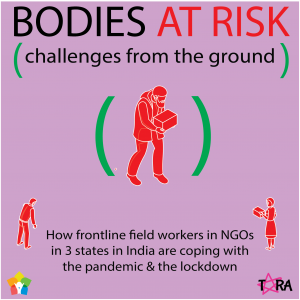
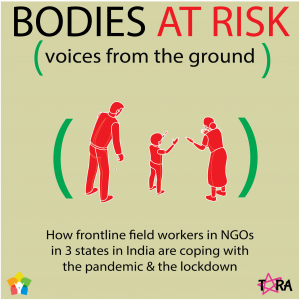
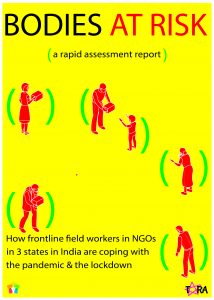






“we shall overcome”
“আমরা করব জয়”
“Haam honge kaamiaab”